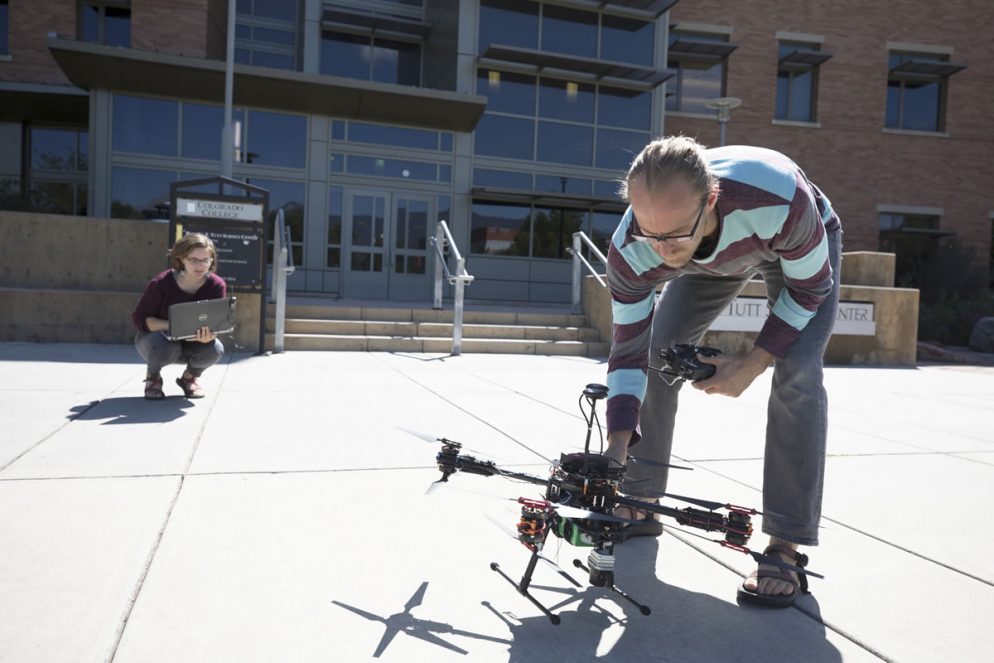In keeping with the mission of providing the finest liberal arts education for students, the college is pursuing many ways of encouraging student research experiences. And summer is the perfect time for it.
Numerous students, of all ages and classes, during the summer work with faculty mentors on research in the sciences, social sciences, humanities, and interdisciplinary fields. Students receive a stipend, and in some cases a campus housing scholarship, and they participate in professional development activities.
Each summer, more than 100 students are engaged in on-campus and off-campus summer research with their faculty mentors.
“I’m mindful of the value that we place on faculty as engaged teachers; on our students’ abilities to sort, analyze, and organize information, and on our hands-on, immersive learning experiences where students are engaged and accountable, and where they are not merely consumers, but co-creators of knowledge,” said Sandra Wong, dean of the college, at the 2015 Summer Collaborative Research Symposium, held each year in the fall.
SCoRe, as the symposium is known, celebrates the research collaborations and accomplishments of students and faculty. This year’s symposium will be Friday, Oct. 6, 3:30-5 p.m. in the Cornerstone Arts Center’s Celeste Theatre.
As early as their sophomore year, CC students are undertaking collaborative summer research with faculty. Students are advised to start planning early in the academic year, as many professors begin to identify and select their summer research students early in the Spring Semester. So, they benefit from talking to their professors and finding out what research projects they are planning for the summer and whether they plan to take on students.
With the hiring this year of Lisa Schwartz ’03, MAT ’04, student collaborative research program coordinator, the college has begun a comprehensive program to encourage students to participate in research in collaboration with faculty.
“CC is committed to supporting an innovation-oriented culture of undergraduate student research and inquiry,” Schwartz says. “We are doing this through collaborative opportunities for intellectual contribution and meaningful mentoring relationships with faculty, which allow students to grow in their individual academic and personal development, identity, and purpose.”
One aspect of the program is a series of workshops and panel discussions over the summer led by faculty and staff for students to learn skills applicable to academic research and their professional development. Schwartz helped organize the series, which was open to students, faculty, and staff.
Some of the topics for the workshops included:
- “Engage with the Public: Your Two-Minute Research Podcast,” by Ryan Bañagale ’00, assistant professor of music
- “Ask Me Anything (Professional)” by Kevin Holmes, assistant professor of psychology
- “Skills? I Got Skills! How to ‘Market’ What You Learn this Summer,”
by Gretchen Wardell, career coach at the Career Center - “Taking it Bird by Bird: Managing Long-Term Writing Projects on the Block Plan,”
by Tina Valtierra, assistant professor of education - “History and Humanities Research in Action,” by Carol Neel, professor of history
Another aspect of the program is informal presentations on campus in Slocum Lounge, where students present the research they are working on for an audience of their peers and faculty who attend. Some of the presentation topics this summer included:
- “Behavioral Effects of Probiotic Supplementation in Rats,” by Paige Anton ’18
and Katelin Teigen ’18 - “Household Bargaining in Polygynous Relationships,” by Lilly Chen ’19
- “Cultural and ‘Extrapolitical’ Ideology in the 2016 U.S. Presidential Election,”
by Helen Griffiths ’18 - “Quantifying Hydrothermal Sealing at Whakaari Volcano, New Zealand,”
by Aaron Farquhar ’18 - “One Pot Povarov Synthesis of Fluorinated Quinoline,” by Jake Emilio ’19
- “David Foster Wallace and Michel Serres: the Phenomenology of Jest,”
by Harper Sherwood-Reid ’18 - “AFM Natural Competence of Soil Bacteria,” by Natalie Sarver ’20 and Sara Worsham ’19
- “Harmonic Mappings from Generalizations of Hypocycloids,” by Lauren Stierman ’20
Additionally, many students also present at the Colorado Springs Undergraduate Research Forum, as well as in their departmental senior research presentation day. Students with strong projects often present at national conferences, and are eligible to apply for support from the conference presentation grant for their conference attendance.
To learn more about student-faculty collaborative research at CC, visit www.coloradocollege.edu/score
